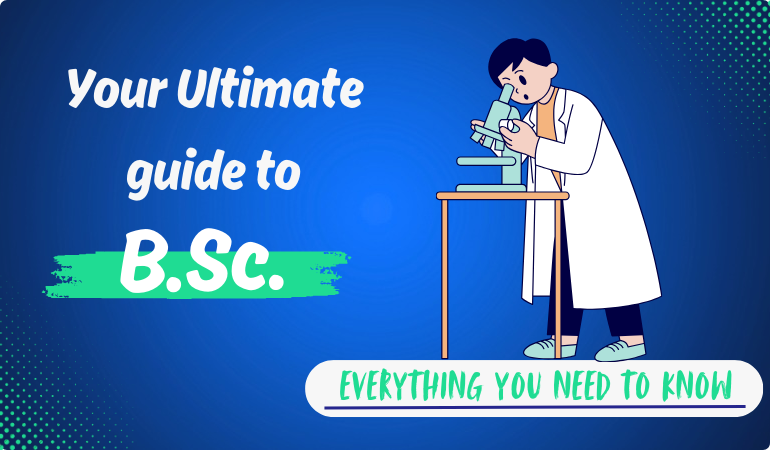The Bachelor of Science, widely recognized as BSc, is a three to four-year undergraduate program focused on core scientific disciplines like physics, chemistry, biology, and mathematics. This degree is designed to build a solid foundation in scientific principles and practical skills that are essential in careers such as research, healthcare, technology, and more.
BSc Course Details: Highlights
| Feature | Details |
|---|---|
| Course Name | Bachelor of Science (BSc) |
| Course Duration | 3-4 Years |
| Course Level | Undergraduate |
| Study Mode | Full-time, Part-time, Distance, and Online |
| Average Fees | INR 20,000 – INR 2,00,000 per year |
| Top Recruiters | Infosys, Wipro, Cognizant, Tata Consultancy Services, DRDO, ISRO |
| Average Starting Salary | INR 3-6 LPA |
What is BSc Full Form?
The full form of BSc is Bachelor of Science. It is an undergraduate degree awarded in various scientific and technical fields. BSc programs emphasize both theoretical learning and practical applications, making it ideal for students interested in pursuing careers in science and research.
Why Study BSc?
There are many reasons to consider pursuing a BSc degree:
- Foundation in Science: The BSc program lays the groundwork in scientific principles that can be applied to various sectors.
- Diverse Specializations: Students can choose from numerous specializations, such as Physics, Chemistry, Computer Science, and Biotechnology.
- Career Opportunities: A BSc degree opens doors to a wide range of job opportunities in both public and private sectors.
- Further Studies: BSc graduates are well-positioned to pursue advanced degrees, such as MSc, MBA, or PhD.
BSc Eligibility Criteria
To apply for a Bachelor of Science (BSc) program, candidates typically need to meet the following criteria:
| Criteria | Requirements |
|---|---|
| Educational Qualification | Completion of 10+2 or equivalent with a science background (Physics, Chemistry, Mathematics, or Biology) |
| Minimum Marks | Generally, 50% aggregate in 10+2; some prestigious colleges may require 60-70% |
| Age Limit | Usually 17-25 years (varies by institution) |
BSc Admission Process
The admission process for Bachelor of Science (BSc) programs can vary based on the institution. Some universities admit students based on merit (marks in 10+2), while others may require entrance exams.
Steps in the BSc Admission Process
- Research: Look for colleges offering BSc programs and review their eligibility criteria.
- Application: Complete the application forms for your selected institutions.
- Entrance Exam: If required, prepare for and appear in entrance exams.
- Merit Lists: Based on entrance or 10+2 scores, institutions will release merit lists.
- Counseling and Admission: Shortlisted students participate in counseling sessions, after which admissions are confirmed.
BSc Entrance Exams 2025
For admission to top Bachelor of Science (BSc) programs, students may need to appear for entrance exams. Here are some popular BSc entrance exams in 2025:
| Exam | Conducting Body | Application Dates (Tentative) | Mode of Exam |
|---|---|---|---|
| IISER Aptitude Test | Indian Institutes of Science Education and Research | March 2025 | Online |
| NEST | National Institute of Science Education and Research | April 2025 | Online |
| BHU UET | Banaras Hindu University | May 2025 | Online |
| IPU CET | Guru Gobind Singh Indraprastha University | April 2025 | Online |
Popular BSc Specializations
Bachelor of Science (BSc) programs offer a range of specializations to cater to students’ interests. Here are some popular ones:
- Bachelor of Science (BSc) in Physics
- Bachelor of Science (BSc) in Chemistry
- Bachelor of Science (BSc) in Mathematics
- Bachelor of Science (BSc) in Computer Science
- Bachelor of Science (BSc) in Biotechnology
- Bachelor of Science (BSc) in Environmental Science
Each specialization has its own scope, subjects, and career pathways, allowing students to tailor their education based on career goals.
BSc Syllabus 2025
The Bachelor of Science (BSc) syllabus varies depending on the specialization chosen. However, some core subjects are common across specializations:
| Core Subjects | Elective Subjects |
|---|---|
| Fundamentals of Physics | Environmental Science |
| Organic Chemistry | Biochemistry |
| Calculus and Algebra | Data Science |
| Genetics | Microbiology |
| Programming | Artificial Intelligence |
Types of BSc Courses
Bachelor of Science (BSc) courses are offered in different modes to suit students’ preferences and needs:
- Full-time BSc: Traditional classroom-based learning.
- Part-time BSc: Ideal for working students who want to study while working.
- Distance BSc: Designed for those who prefer flexibility; offered by institutions like IGNOU.
BSc Online Courses
Online Bachelor of Science (BSc) courses allow students to study from anywhere and are suitable for those with time constraints or other commitments. Many institutions, including IGNOU and Amity University, offer UGC-recognized online BSc courses.
Best BSc Colleges in India
Top colleges across India offer quality Bachelor of Science (BSc) programs with excellent faculty, facilities, and career prospects.
Best Government Colleges for BSc
| College Name | Location |
|---|---|
| Indian Institute of Science (IISc) | Bangalore |
| Miranda House | Delhi |
| St. Stephen’s College | Delhi |
| Banaras Hindu University (BHU) | Varanasi |
| Madras Christian College | Chennai |
Best Private Colleges for BSc
| College Name | Location |
|---|---|
| Christ University | Bangalore |
| St. Xavier’s College | Mumbai |
| Amity University | Noida |
| SRM University | Chennai |
| Manipal University | Manipal |
BSc Courses in IIT
The Indian Institutes of Technology (IITs) also offer specialized BSc courses in fields such as Physics, Chemistry, and Mathematics. These programs are highly competitive and usually require students to qualify through entrance exams like the IIT-JEE or other institution-specific tests.
BSc Career Scope: Job Profiles, Salary & Top Recruiters
A Bachelor of Science degree opens doors to various career options in sectors such as technology, healthcare, education, and research. Here’s a look at potential job profiles, average salaries, and top recruiters.
BSc Job Profiles
| Job Profile | Description |
|---|---|
| Research Scientist | Conducts experiments and research in scientific fields |
| Laboratory Technician | Manages laboratory equipment and assists in research |
| Data Analyst | Analyzes data to derive meaningful insights |
| Teacher/Lecturer | Teaches science subjects in schools or colleges |
| Biochemist | Studies chemical processes within living organisms |
BSc Salary in India
The salary for BSc graduates in India can vary depending on specialization, experience, and industry.
| Job Profile | Average Salary (INR) |
|---|---|
| Research Scientist | 4-8 LPA |
| Laboratory Technician | 3-5 LPA |
| Data Analyst | 5-8 LPA |
| Teacher/Lecturer | 3-7 LPA |
| Biochemist | 4-9 LPA |
BSc Top Recruiters
Some of the top recruiters for BSc graduates include:
- Tata Consultancy Services (TCS)
- Wipro
- Infosys
- Indian Space Research Organisation (ISRO)
- Dr. Reddy’s Laboratories
- Lupin Pharmaceuticals
What After BSc?
After completing a BSc degree, students have multiple options to further their education and enhance their career prospects:
- Master’s Degree (MSc): Specialize in your field of interest with an MSc degree.
- Professional Courses: Consider professional certifications in data science, biotechnology, or environmental science.
- MBA: For students interested in managerial roles, pursuing an MBA can be advantageous.
BSc Courses Abroad for Indian Students
Studying a Bachelor of Science abroad offers students a unique perspective, exposure to global academic standards, and better job opportunities. Countries like the United States, Canada, United Kingdom, and Australia offer excellent BSc programs with world-renowned faculty and infrastructure.
Popular Destinations for BSc Abroad
| Country | Top Universities |
|---|---|
| United States | Harvard University, MIT, Stanford University |
| United Kingdom | University of Oxford, University of Cambridge |
| Canada | University of Toronto, University of British Columbia |
| Australia | University of Melbourne, Australian National University |
Benefits of Studying BSc Abroad
- Global Exposure: Gain insights into diverse cultures and practices.
- Quality Education: Access to cutting-edge resources and labs.
- Career Opportunities: Potentially higher salary packages and opportunities in international organizations.
Q: What is the duration of a Bachelor of Science (BSc) course, and does it vary by specialization or country?
A: The typical duration for a BSc course in India is 3 years. However, in some countries like the United States, BSc programs usually span 4 years. Additionally, specialized BSc programs such as BSc (Hons) or professional courses may sometimes extend beyond the standard duration. Always check the specific requirements of the institution or country where you plan to study.
Q: Can I pursue a BSc after completing my 12th grade in a non-science stream?
A: Generally, a science background is required to pursue a BSc degree, particularly in fields like Physics, Chemistry, Biology, and Mathematics. However, some interdisciplinary specializations like Environmental Science or Psychology may accept students with diverse educational backgrounds. Institutions may have different eligibility criteria, so it’s important to confirm the prerequisites of the specific BSc program you are interested in.
Q: Are there entrance exams for BSc admissions, and which ones are the most popular?
A: Yes, some universities and colleges require entrance exams for BSc admissions, especially for sought-after programs. Popular BSc entrance exams include the IISER Aptitude Test, BHU UET, and IPU CET. Entrance requirements vary by institution, so it’s advisable to review each university’s admissions process for specific requirements.
Q: What are the career opportunities after completing a BSc degree?
A: A BSc degree opens a wide array of career opportunities across industries such as healthcare, IT, education, and research. Graduates can work as Research Scientists, Data Analysts, Biochemists, Laboratory Technicians, and more. Additionally, BSc holders may pursue further studies, such as a Master’s degree (MSc), MBA, or specialized certification courses, to expand their career prospects.
Q: Is it possible to pursue a BSc degree online, and are these programs equally recognized?
A: Yes, many universities and institutes offer online BSc courses that are recognized by accreditation bodies, making them valid for job placements and further studies. Online BSc courses are especially beneficial for students with time constraints or professional commitments. However, it’s crucial to choose UGC-recognized or government-accredited institutions to ensure the degree holds value in the job market.
Q: What are the main differences between a BSc and a BSc (Hons) degree?
A: A BSc (Hons) or Bachelor of Science (Honours) degree is generally more specialized and focuses deeply on a particular subject, whereas a regular BSc may cover a broader range of topics within the sciences. BSc (Hons) programs are often preferred by students aiming for research, academic careers, or higher studies because of their intensive curriculum. Some employers and academic programs also view BSc (Hons) degrees as more advanced.
Q: How much does a BSc graduate typically earn in India, and what factors influence this salary?
A: The starting salary for BSc graduates in India varies based on factors like specialization, job role, experience, and industry. On average, BSc graduates can expect an annual salary of INR 3-6 LPA. Specializations in technology fields, data science, and biotechnology tend to offer higher starting packages, while experience, location, and additional certifications can further enhance earning potential.
Q: Is studying BSc abroad beneficial, and what are the popular destinations for Indian students?
A: Studying BSc abroad can be highly beneficial due to exposure to global teaching standards, access to advanced research facilities, and enhanced career opportunities. Popular destinations include the United States, United Kingdom, Canada, and Australia, where institutions like Harvard, the University of Oxford, and the University of Toronto are well-regarded for their BSc programs. Additionally, international degrees can provide an edge in competitive global job markets, especially in research and technology-driven fields.


